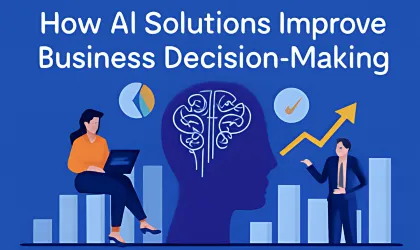Introduction
Did you know that businesses leveraging AI solutions are 2x more likely to outperform their competitors, according to a 2024 Gartner report? In today’s fast-paced world, making informed decisions quickly is critical for success. Artificial intelligence (AI) is revolutionizing how companies operate by providing actionable insights, streamlining processes, and minimizing risks. This blog explores how AI solutions improve business decision-making, offering a competitive edge across industries like retail, healthcare, and finance. By harnessing data-driven insights, businesses can make smarter, faster, and more impactful choices with platforms like Gignaati.
Understanding AI in Business Decision-Making
What is AI in Business?
Artificial intelligence refers to technologies like machine learning, predictive analytics, and natural language processing (NLP) that enable computers to mimic human intelligence. In business, AI analyzes vast amounts of data to support decision-making, from forecasting sales to optimizing supply chains.
Why It Matters
Traditional decision-making often faces challenges like human bias, incomplete data, and time constraints. AI solutions overcome these hurdles by processing data at scale, identifying patterns, and delivering objective insights. For instance, business intelligence tools powered by AI help leaders make informed choices without relying solely on intuition.
Examples Across Industries
- Retail: AI predicts customer preferences to optimize inventory.
- Healthcare: AI assists in diagnosing diseases with high accuracy.
- Finance: AI detects fraudulent transactions in real time.
Looking for more insights? Explore our blog for the Top 10 AI Solutions Every Business Needs in 2025.
Key Ways AI Improves Business Decision-Making
2.1 Data-Driven Insights
AI solutions excel at processing massive datasets to uncover hidden trends and patterns. Predictive analytics, for example, forecasts future outcomes based on historical data, enabling businesses to anticipate market shifts. In retail, AI analyzes customer purchase histories to predict inventory needs, reducing overstock and waste.
2.2 Enhanced Efficiency and Speed
AI automates repetitive tasks like data analysis and reporting, freeing up time for strategic decision-making. Real-time decision-making is another key benefit, as AI-powered tools like chatbots or CRM systems provide instant insights. For example, AI in CRM streamlines customer interactions by prioritizing leads based on their likelihood to convert.
2.3 Risk Reduction and Accuracy
AI minimizes human error and biases, ensuring more accurate decision-making. In finance, AI solutions power fraud detection systems that analyze transactions in real time, flagging suspicious activity with over 95% accuracy (per a 2023 Forbes study). Similarly, AI aids in compliance and risk assessment, helping businesses stay ahead of regulatory challenges.
2.4 Personalization and Customer Insights
AI analyzes customer data to deliver personalized experiences, boosting satisfaction and loyalty. Recommendation engines, like those used by Netflix or Amazon, suggest products based on user behavior, driving sales. By leveraging customer insights, businesses can tailor marketing campaigns and improve retention rates.
Real-World Applications of AI in Decision-Making
Case Studies
- Retail: Amazon uses AI solutions to optimize pricing and inventory. Its predictive analytics models forecast demand, reducing stockouts by 20% annually.
- Healthcare: IBM Watson’s AI supports doctors by analyzing patient data to recommend treatments, improving diagnostic accuracy by 30% in some cases.
- Manufacturing: General Electric employs AI for predictive maintenance, analyzing equipment data to prevent failures, cutting downtime by 15%.
Key Takeaway
These examples, including Gignaati’s client successes, show how AI solutions deliver measurable outcomes, from cost savings to revenue growth, by enhancing decision-making across diverse sectors.
Challenges and Considerations
Data Quality
AI relies on clean, reliable data. Poor-quality data can lead to inaccurate insights, undermining decision-making. Businesses must invest in robust data management systems to ensure AI solutions perform effectively.
Ethical Concerns
AI can perpetuate biases if not designed responsibly. Transparency and fairness in AI models are critical to building trust. Regular audits and diverse training data can mitigate these risks.
Implementation Costs
Adopting AI solutions requires upfront investment in technology and training. However, the long-term ROI—from improved efficiency to reduced risks—often outweighs initial costs.
Solution
Start with scalable AI tools, such as those offered on Gignaati’s AI tools platform. Invest in employee training to bridge the AI skills gap and ensure smooth integration.
How to Get Started with AI for Decision-Making
- Identify Opportunities: Pinpoint areas where AI can add value, such as marketing, operations, or customer service.
- Choose the Right Tools: Select AI solutions tailored to your industry, like those available on Gignaati’s AI tools platform.
- Build Data Infrastructure: Ensure your data is organized and accessible for AI analysis.
- Partner with Experts: Collaborate with Gignaati’s AI experts to implement solutions effectively.
Call to Action: Ready to transform your decision-making? Consult Gignaati’s AI team to explore AI solutions and start leveraging your business today.
Conclusion
AI solutions empower businesses to make smarter, faster, and more accurate decisions by leveraging data-driven insights, enhancing efficiency, reducing risks, and personalizing customer experiences. With platforms like Gignaati, businesses can access top AI experts and customizable AI tools to stay ahead in a competitive landscape. Embrace AI today to unlock smarter decision-making and drive your business toward a brighter future.
Frequently Asked Questions
What benefits does AI bring to business decisions?
AI improves accuracy, speeds up data analysis, reduces bias, automates routine tasks, and offers valuable predictions for better planning.
How does AI reduce bias in decision-making?
By relying on data and objective algorithms, AI minimizes the influence of human emotions and unconscious prejudices.
Is AI easy to integrate with existing business software?
Many AI tools are designed for integration, though some technical effort may be required to connect with legacy systems.
What challenges do companies face when adopting AI?
Challenges include managing data quality, protecting privacy, ensuring smooth integration, and training employees for AI collaboration.
Which sectors benefit the most from AI-driven decisions?
Finance, retail, healthcare, and manufacturing are prominent sectors leveraging AI to improve decisions.
